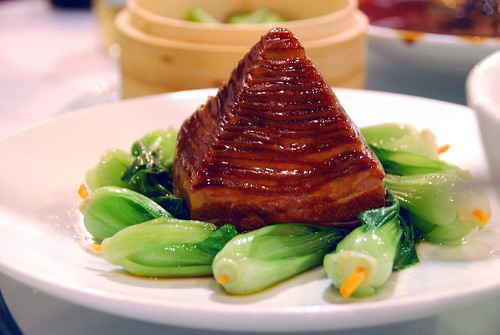Posts Tagged ‘Huangshan’
Oh, the highs and lows of traveling through China! There were definitely some lows (see Qingdao: Confronting Identity in a German Town in China and Yangshuo: Anatomy of a Scam), but the peaks and the valleys seem to flow into one another so that you’re no longer sure what hurts so bad and what hurts so good. Our Yangzi Three Gorges River Cruise is the perfect metaphor: we spent three days on a 4th class river boat with a bunch of half-naked Chinese people who only stopped smoking cigarettes, spitting, and playing mahjong long enough to follow a megaphone-wielding tour guide around in 100 degree heat. Yes, it was unpleasant at the time. But even now, almost 3 months after the fact, we bring it up in conversation almost every week and giggle at the absurdity of it all. It’s sort of like running a marathon: when you’re in the moment, you can feel blinded by the pain, but once it’s over, you’re really glad you did it.
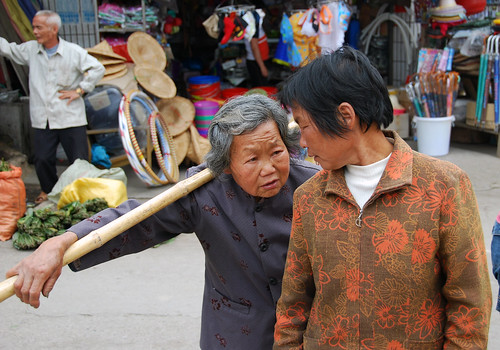
Ladies at the market near Hakka House.
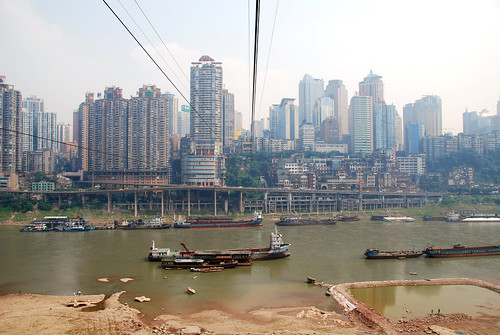
View of Jiefangbei from across the Jialing River in Chongqing.
As Jeremy put it, “of all the countries we’ve been so far, China is the one I would have most regretted missing.” China is relevant, y’all. It is freaking fascinating there right now, a place where nothing stays the same for more than a few weeks, the government is still messing with people’s civil liberties in exchange for making them rich, and people are spitting on the street in their US$500 Gucci heels. We think every Westerner should go. Observe. Learn. And see what a country of 1.3 billion people all working together to pull their country up by its bootstraps looks like. There’s no place like it.
Days spent here: 43 (26 days in Southern and Central China, 17 days in the North)
Highlights: Huangshan, Yangshuo (for Jeremy), Yangzi River Three Gorges Cruise (somewhat painful, but also unforgettable), Beijing
Places we would like to visit next time: Western China (i.e., Tibet, Xinjiang, Jiuzaigou) and Mongolia
Average daily expenditures (for two people): US$213 for 13 days on our 5 star hotel/fancy eating tour with my parents (heavily supplemented by Jack and Wendy—thanks Mom and Dad!), US$120 for the remaining 30 days on our usual 1 star hotel/street food backpackers tour
Prices: China’s pretty reasonable. Food is very inexpensive (from US$5-10 per person per meal) and accommodation can be pretty cheap too. On average, we paid about 200 RMB (approx. US$30) per night for a double room ensuite. We used hostelbookers.com and Ctrip.com to book our accommodation, and we got great deals using both websites.
Weather: Do yourself a favor and don’t visit northern China in June or July, unless you like your searing heat with a dash of crushing humidity. Don’t say we didn’t warn you.
Language: There are 300 million people in China learning English right now—that’s the same number of people that live in the US! But you wouldn’t know it from traveling in this country. If you don’t speak Mandarin, polish your pantomiming skills before you go. On the other hand, if you are a wai guo ren with Mandarin speaking skills, prepare to be worshipped. The people will fall all over themselves with delight.
If you do speak Chinese, be warned that you will need to overcome not only regional accents, but regional phrases as well (ex. if you are from Taiwan, you will call a spoon a tiao gen, but a Beijinger will refer to it as a shao zi). For instance, I had the following conversation with a person in Taishan (in Chinese, of course):
Hope: Excuse me, do you know if there is a pharmacy around here?
Random Person: A what?!? A pharmacy?
H: Yes, a pharmacy.
RP: I don’t know. Why don’t you go ask over there [points to a pharmacy], at the medicine store?
Oh yeah, and if you’ve ever been interested in visiting China, go now, before all the Chinglish gets wiped out.
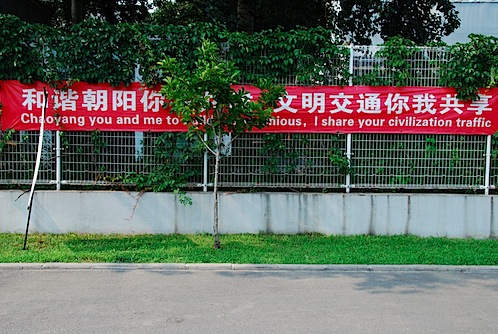
One day, China will be void of gems like this (reads: Chaoyang you and me to build harmonious, I share your civilization traffic)
Food: Outside of our eating tour with my parents and the food in Beijing, we weren’t too impressed with Chinese cuisine. We said it before and we’ll say it again: if you want the best Chinese food in the world, go to Taiwan.
That being said, China is a great place if your culinary hero is Anthony Bourdain. We got over ourselves really fast in Chongqing, where my aunt’s friends took us out to meals involving pig brains, duck tongues, cow rumen, and various other intestinal elements. You can also try snake, turtle, or live scorpions. Yum?
Transit: China’s got a pretty good rail system for such a big country. Chinese trains are not quite as nice as the trains in Taiwan or Japan, but they’re not as bad as the trains in Vietnam, either. For long journeys, you can purchase tickets for a soft sleeper (most expensive), hard sleeper, soft seat, or hard seat (cheapest). Soft sleeper trains are pretty nice, with 4 beds in each room, AC, clean sheets, and relatively clean bathrooms. “Hard sleeper” sounds scary, but it’s worth noting that hard sleeper beds aren’t hard—the mattress is just a little bit thinner. The biggest difference is that there are 6 beds in the hard sleeper rooms rather than 4. Since J and I are tall, we usually traveled in the soft sleeper trains, which are still relatively cheap, even though tickets are 1.5-2 times as much as the hard sleeper carriages.
For information on routes, schedules, and prices, check out ChinaTravelGuide.com’s fabulous online train schedule database.
The bigger cities like Shanghai and Beijing have subways, but Shanghai’s subway system has pretty bad signage and confusing connections. Beijing’s subway did not reach most of the sites in the city center, so we did a LOT of walking or took taxis. Luckily, taxis are very cheap in China’s capital city, but you’re going to have to speak Mandarin in order to get where you want to go.
Internet: Web access is great all over China—as long as the government isn’t blocking the site you want to surf. YouTube, Flickr, Facebook, Twitter, and all blogspot sites got blocked for periods of 3-10 days while we were in China due to the 20th anniversary of Tiananmen Square and the deadly Uighur protests in Xinjiang. Annoying.
Culture: Get ready for a culture shock. Get ready for people constantly cutting in front of you in line. Get ready for men walking around in inappropriate places with their shirts hiked up above their nipples. Get ready for spitting. Get ready for half-naked babies pooping in the street. Get ready for smoking. Get ready for LOUD. That being said, once you figure out how things work, it’s easy enough to deal with them.

Baby at the Summer Palace wearing the poop pants.
One fascinating thing about traveling through Taiwan and China is that we got a firsthand look at how differently these two countries developed culturally. The Taiwanese are exceedingly polite, aggressively helpful, and overly concerned about safety. The Chinese on the other hand, are rude and pushy, frequently uninterested in helping you, and some of the craziest drivers in the world. Now, you could point to many reasons for this cultural gap: the fact that it was the intellectuals and people of the upper classes that moved to Taiwan in 1949 to escape Communist persecution, the effect of 60 years of Communist rule on the people of China, etc. But I’d like to propose a different hypothesis: It’s the sheer numbers. There are 57 times as many people in China as Taiwan. You would get CRUSHED in China if you were nice and helpful to people all the time. The result is, if someone vouches for you in China (as my aunt did, in our case), you get extreme, excessive kindness from people that you may only marginally know you. But those same people on the street may wave you off if you ask for help. Yes, it’s a contradiction. But it’s a fact of life here. All I can say is, try to make friends with a local. If you do, you will get the red carpet rolled out for you.
In short: It’s not always pleasant, but that doesn’t mean it’s not a great time.
Note: Hey everyone, let’s give a warm welcome to Eddo! My little bro shares his thoughts as the family travels Huangshan…I love that even though this post is about a mountain, he manages to nerd out on urban planning. Kudos, Eddo! ![]()
As an urban planning nerd/activist, I’ve always been interested in the growth and history of cities. Why did this particularly scenic peninsula morph into modern-day San Francisco? How did the end of the Mississippi River support a multi-ethnic creole population like New Orleans? How did two tiny islands in the middle of the Seine River become a focal point for a global city? How did civilization in the past evolve into its current form, and how do our actions today determine tomorrow’s society?
Anyways, enough of this urban speculation—I promise I’ll get back to it later—let’s get to the heart of this entry. Huangshan (in English, “Yellow Mountain”) is located in the Anhui province of China, and is a major mountain range which has been opened up for tourism. It has inspired countless Chinese poems, literature, and paintings, and deservedly so, because it is one of the most scenic and beautiful places I’ve ever personally experienced.
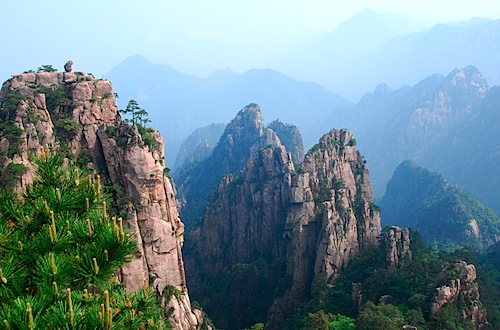
Monkey Rock (the little rock perched on top of the huge stone on the left) overlooking the Valley.
I’ve never been to China before, let alone Huangshan. The last time I was remotely close to China was probably when I was 6 or 7 years old, and was in Taiwan for my Da Jo Jo’s and Da Jo Ma’s wedding. I don’t really recall much from that time, except I liked riding on my youngest uncle’s motorcycle/scooter, and that it was really hot. So for me, Huangshan was not only an eye-opening experience, but also my introduction to China.
China’s problems with rapid modernization and urbanization are well-documented, and I don’t think I need to go into too much detail, but to be introduced to China via its rural and agricultural communities, is, in a word, refreshing. We in America like to glorify a simpler time—when seasonality and locality weren’t just buzzwords for haute cuisine, when communities and societies flourished not because of economic indicators like GDP and inflation rates, but instead on the reliance of individuals in each community to provide a good or service necessary to its citizens. And this is what China is about, I think. Despite its rapid modernization, at the core of all production is people—roads are created by people moving around rocks in wheelbarrows, crops are planted by people leading water buffalo through a field. The concept of labor here is unlike America, where machines have taken over the most difficult of tasks. If there is a resource that China has utilized more so than any other country, it is its people. Performances like the Beijing Olympics Opening Ceremony requiring massive amounts of people, control, coordination, planning, and creative vision, could not have happened anywhere else in the world. Of course, this is both a positive and negative—things are built or created at a frenetic place, but the value of human labor is less than in other countries and services rendered by humans cost exponentially less than anywhere in the West. People are valued less as specialized individuals as they are cogs in a well-oiled economic machine.
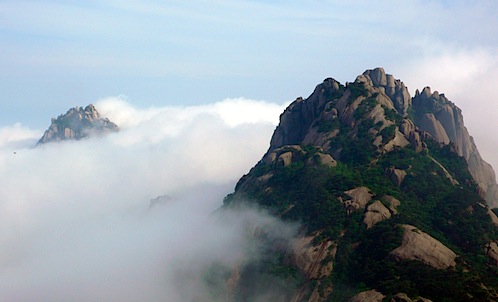
Huangshan’s famous “cloud ocean.” It literally moves in and out in minutes.
Walking through Huangshan is a series of stone steps and pathways meandering along streams, cliffs, forests, and valleys. It is stunning. But you do get a sense of devaluation of individual labor. Couriers or porters carry up all goods that are used by the hotels at the top of the mountains (Ed. note: Indeed, supplies are not allowed to be hauled up the mountain on the gondola—even though it is surely cheaper to mechanize the delivery of these goods—in order to create jobs for local farmers who otherwise wouldn’t be able to earn a decent wage), luggage from tourists, and in some cases, people who cannot walk up or down the grueling paths of the mountain. It is incredible—I can’t imagine the amount energy or labor involved. They get paid by the kilo, and generally balance inhuman amount of goods on a single bamboo stick on their back. Our tour guide told us that they can make up to 1,000 RMB a month (around US$150) which is actually a decent salary in their area. Individuals who work in the hotels on the top of the mountain stay up there for three months at a time, and get free room/board while earning salary.
I don’t know how old the trails and steps of Huangshan are, but one does get a sense of how civilization and societies emerged in the olden days. Locations were picked based on geographic resources, and paths were then created to connect major population centers with each other. Much like cities in America developed along the Mississippi River from Chicago down to New Orleans due to geography and natural resources, I imagine this is how “cities” developed in Huangshan. Except in Huangshan, these “cities” are essentially outdoor plazas with hotels and restaurants, instead of actual cities. But these gathering places and webbed network of paths towards peaks and valleys and sights are in a sense, a microcosm of China, where cities are connected to each other by a network made up of boats, rail, roads, and planes rather than stone steps.
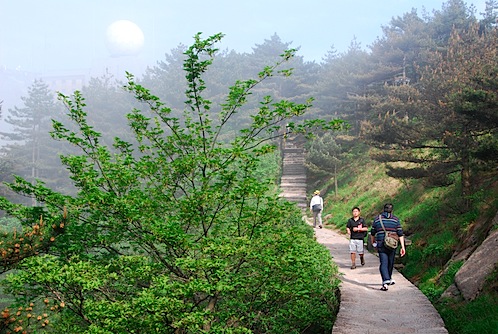
Eddo hiking towards the giant golf ball (on the left, in the background), a weather station located at Huangshan’s highest point.
Huangshan, much like the rest of China, encompasses a scale that I can barely comprehend. It is stunning. It is dramatic. It is imposing and it is spectacular. It is filled with jagged peaks, intense sunrises (which we woke at 4:30 for, climbed up a mountain and after concluding we wouldn’t see it, started hiking back down the mountain, only to see the sun peak through the trees, d’oh!), and ancient trees and wildlife. The Chinese have a saying that Huangshan is number one—after experiencing Huangshan, you need not experience any other mountains. My mother, who was also experiencing China for the very first time (she was born in Taiwan and because of China’s irregular rules on tourism during the Mao era, she hasn’t been able to visit until China became more open in the years after Mao’s death and China’s embrace of capitalism) celebrated her birthday on top of Huangshan. She said “I had always heard of Huangshan ever since I was a little girl but was never able to experience it firsthand until now. I cannot believe that I am celebrating my birthday here. I am so happy.” I think we’d all agree—there is no experience like Huangshan in the world, and despite what you may think about China politically, Huangshan is not just a Chinese treasure, but a treasure for the world.
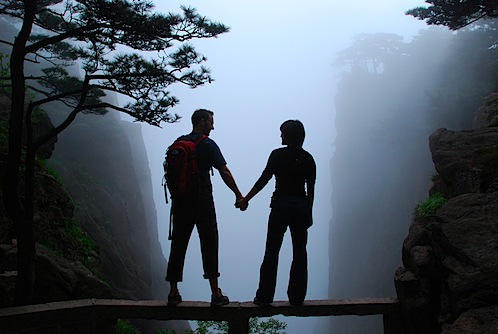
P.S. Here is a link to Eddo’s photos of Huangshan on his Facebook.

